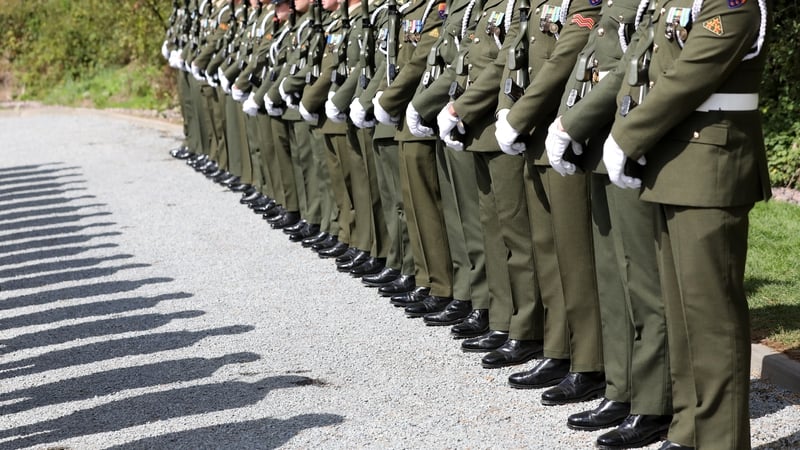
The Irish Defence Forces has lost roughly a fifth of its personnel over the past two years, the Public Accounts Committee (PAC) has been told.
Secretary General of the Department of Defence Jacqui McCrum revealed that 1,646 staff left the service in the last two years.
The figure is comprised of 891 departures in 2022 and 755 last year.
Independent TD Verona Murphy noted that this was 21% of the current active service roster of 7,500.
She also pointed to the recommended staffing level of 11,500.
But Ms McCrum said that "significant efforts" are being put into recruitment, with good results, particularly in the naval service.
"We are turning the tide on that," she said, and told the committee that, while the navy recruited 68 people last year and lost 95, in the first quarter of this year, 31 were recruited and 14 left.
Noting the "51% spread", Ms McCrum said that this was "very positive".
"They're the green shoots that we're looking at."
Elaborating on efforts to improve recruitment and retention, Ms McCrum said that the starting salary in the Defence Forces has risen from €29,000 to €39,000 since 2020 - a 34% increase - while the department has a recruitment advertising budget of €2.4m this year.
'Broadly on target'
Ms McCrum said that there are "strong governance structures in place to manage and maintain" the €255m stock of military equipment, via "a network of almost 400 store accounts" which are operated nationwide and internationally.
She assured the committee that the department is "broadly on target" in its efforts to overhaul those stores of equipment.
"I very much welcome this report from the Comptroller and Auditor General, and accept all the recommendations made," she said of last September's report from the C&AG.
"I have put in place a working group that has developed a work plan and will oversee their implementation."
The C&AG found that the key recommendations of the Dunning Report, which was published in 2014, have yet to be implemented.
Ms McCrum conceded that "there had been other working groups established" to address this matter, but insisted that the latest is the "final" such group.
She said that, of the six outstanding recommendations from the Dunning Report, three have now been completed.
In 2022, claims against the Defence Forces cost €3m, the committee also heard.
At the start of that year, there had been 521 cases on hand.
A further 61 were received, 87 were closed, leaving 495 on hand at year end.
Social Democrats TD Catherine Murphy asked about the recent High Court case, which ruled that a Defence Forces ban on soldiers attending unofficial protests and parades was unconstitutional.
The case was taken against the Minister for Defence, Ms McCrum noted.
"The judgement is over 90 pages long and will be reviewed by the legal team," she told the TD, "after which actions will be taken" if any are warranted.
The ruling "does give personnel freedom to talk about their pay and conditions where they couldn't before," Ms Murphy said, welcoming the development.
Tánaiste and Minister for Foreign Affairs Micheál Martin said that the Government is giving the ruling "appropriate consideration, and obviously the potential for appeal is still there".
Mr Martin told the Oireachtas Committee on Foreign Affairs and Defence that no decision has been taken on whether to mount an appeal.
He also defended Government plans to put limits on what public commentary members of the Defence Forces are allowed to make on Government policy.
Under lengthy and detailed questioning at the committee, the Tánaiste defended aspects of the Defence (Amendment) Bill 2024.
He said that limits have long been in place and defended provisions in the bill.
Labour TD Brendan Howlin objected to what he called "a blanket prohibition" on any comment by Defence Forces members on Government policy.
"I'm not saying that," Mr Martin replied.
"There is a need for caution here in the degree to which one allows for latitude, or excessive latitude, around this because it could subsequently compromise actions and roles of our Defence Forces," for example as peacekeepers, he said.
If "a significant number" of Defence Forces personnel took a position on a given conflict, "that could subsequently compromise our engagement in certain theatres", the Tánaiste warned.
But he accepted some of the concerns raised, adding that "there is a balance to be struck here".
Noting the "51% spread", Ms McCrum said that this was "very positive".
"They're the green shoots that we're looking at."
Elaborating on efforts to improve recruitment and retention, Ms McCrum said that the starting salary in the Defence Forces has risen from €29,000 to €39,000 since 2020 - a 34% increase - while the department has a recruitment advertising budget of €2.4m this year.
'Broadly on target'
Ms McCrum said that there are "strong governance structures in place to manage and maintain" the €255m stock of military equipment, via "a network of almost 400 store accounts" which are operated nationwide and internationally.
She assured the committee that the department is "broadly on target" in its efforts to overhaul those stores of equipment.
"I very much welcome this report from the Comptroller and Auditor General, and accept all the recommendations made," she said of last September's report from the C&AG.
"I have put in place a working group that has developed a work plan and will oversee their implementation."
The C&AG found that the key recommendations of the Dunning Report, which was published in 2014, have yet to be implemented.
Ms McCrum conceded that "there had been other working groups established" to address this matter, but insisted that the latest is the "final" such group.
She said that, of the six outstanding recommendations from the Dunning Report, three have now been completed.
In 2022, claims against the Defence Forces cost €3m, the committee also heard.
At the start of that year, there had been 521 cases on hand.
A further 61 were received, 87 were closed, leaving 495 on hand at year end.
Social Democrats TD Catherine Murphy asked about the recent High Court case, which ruled that a Defence Forces ban on soldiers attending unofficial protests and parades was unconstitutional.
The case was taken against the Minister for Defence, Ms McCrum noted.
"The judgement is over 90 pages long and will be reviewed by the legal team," she told the TD, "after which actions will be taken" if any are warranted.
The ruling "does give personnel freedom to talk about their pay and conditions where they couldn't before," Ms Murphy said, welcoming the development.
Tánaiste and Minister for Foreign Affairs Micheál Martin said that the Government is giving the ruling "appropriate consideration, and obviously the potential for appeal is still there".
Mr Martin told the Oireachtas Committee on Foreign Affairs and Defence that no decision has been taken on whether to mount an appeal.
He also defended Government plans to put limits on what public commentary members of the Defence Forces are allowed to make on Government policy.
Under lengthy and detailed questioning at the committee, the Tánaiste defended aspects of the Defence (Amendment) Bill 2024.
He said that limits have long been in place and defended provisions in the bill.
Labour TD Brendan Howlin objected to what he called "a blanket prohibition" on any comment by Defence Forces members on Government policy.
"I'm not saying that," Mr Martin replied.
"There is a need for caution here in the degree to which one allows for latitude, or excessive latitude, around this because it could subsequently compromise actions and roles of our Defence Forces," for example as peacekeepers, he said.
If "a significant number" of Defence Forces personnel took a position on a given conflict, "that could subsequently compromise our engagement in certain theatres", the Tánaiste warned.
But he accepted some of the concerns raised, adding that "there is a balance to be struck here".

